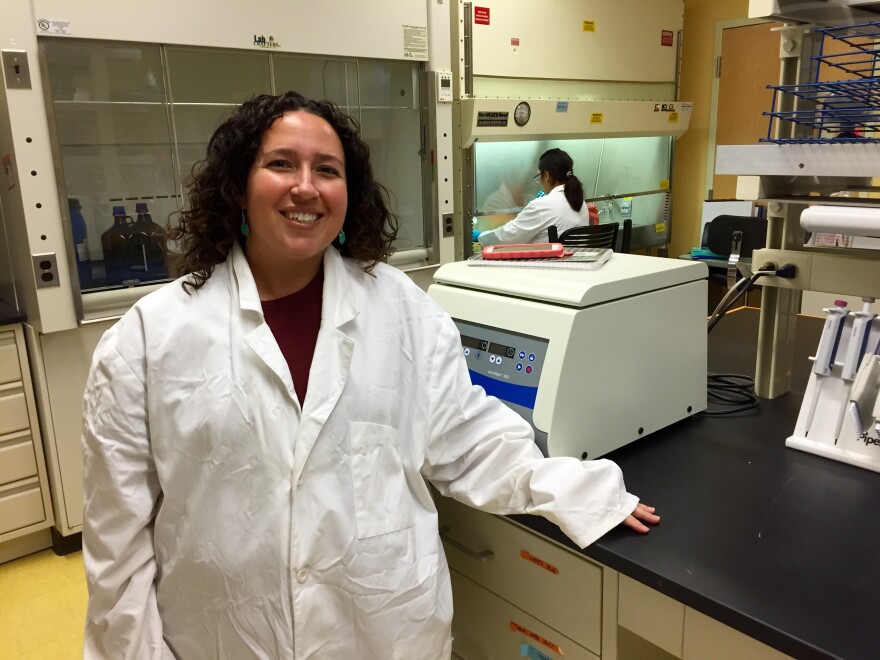Dr. Paula Rivadiniera is an extension specialist at the University of Arizona Yuma Field Office. Her work is focused on biological and other threats to food safety in local fields.
KAWC reached out to her for reaction to an alert from the Centers for Disease Control telling consumers, restaurants, and retailers to discard all romaine lettuce. The origin of the outbreak is not known and no agricultural region has been singled out as the source.
Rivadiniera says her initial reaction, along with local growers, is shock. Following is a transcript of our conversation.
KAWC: Your Initial reaction to this sweeping alert from the CDC?
Paula Rivadiniera (PR): I would say I’m pretty shocked. I think the growers are shocked. As you know during the spring outbreak the FDA and the CDC really focused on Yuma-Yuma-Yuma, kind of giving us a black eye. And now here we are having this massive, sweeping warning not to eat any romaine from anywhere, even though here in Yuma we’ve been making a huge effort to bounce back and build consumer trust, and we didn’t even have lettuce that was harvested at the time that they had these initial outbreaks.
"I would say I'm pretty shocked. I think the growers are shocked." - Dr. Paula Rivadiniera
KAWC: Will this have any impact on the future of Yuma? They’ve taken orders for romaine, haven’t they, for this season?
PR: Absolutely. There is romaine in the ground right now. So yeah, I mean it is definitely going to impact us if everyone is being warned not to eat any romaine at all, regardless of where it came from. You can imagine that growers are definitely going to be hearing from their shippers. So we don’t know what it means yet. We don’t know if the shippers are going to call and tell the growers they don’t want the romaine. That’s definitely a possibility. And that could be a huge impact on our growers.
KAWC: It seems like though, that this might be beyond the grower’s level. That it might actually be something in the supply chain?
PR: Absolutely. And that’s one of the things that really bugs me. You know from the perspective of being a food safety extension specialist, we find that when there are outbreaks, often times, they want to know where the food was grown, they want to know exactly which field it came from, which farmer grew it. But there’s a whole bunch of people along that supply chain who touch that food, who touch that lettuce. It goes through processing. It gets on trucks. You know there’s lots of refrigeration so there’s temperatures to worry about. So many other aspects that could be involved in any outbreak. So, I find it strange that we go straight to the farmer and almost assume that that’s where it came from, somewhere in our fields. And it just doesn’t seem realistic for some of these outbreak, particularly for the spring outbreak.
KAWC: Given that, and even though this outbreak isn’t related to Yuma at all, couldn’t possibly be given where we are in the season, what will Yuma growers and the industry do now? Give people a sense of how the local Ag community reacts to news like this?
PR: It’s pretty devastating to think that shippers could start calling and cancelling their orders. That is a huge concern. For right now the farmers are sitting tight and waiting to hear from the shippers because most of them are growing for shippers, for buyers, for other people. And so the product belongs to them and they are waiting to hear from them. And there is the potential that there could be something really devastating that could happen if the shippers start calling to cancel the orders. That said, it is pretty clear, based on the dates of the onset of illness, that those harvested products did not come from Yuma. And so we are sitting tight, fingers crossed, that the FDA and the CDC will do their trace-back investigation and at some point we’ll come out with news that the Yuma produce is still safe to eat.
"It is pretty clear, based on the dates of the onset of illness, that those harvested products did not come from Yuma." - Dr. Paula Rivadiniera
KAWC: Is there anything else you’d like to add?
PR: Just that our famers have really been doing a great job at coming back from what happened in the spring. They really rallied together and they really want to come up with solutions for food safety. And I think it is important for everyone to remember that we serve billions of servings of leafy greens to consumers all over the country, and outside the country, every year. And so while we have had a number of unfortunate food safety related incidents, the number of servings that get sold, when you look at the percentage of people that are getting healthy, safe, fresh food, it is amazing. So I hope that people will not focus as much on seeing that there is another food safety related outbreak and know that our farmers are doing everything in their power. They care just as much about public health as the CDC and FDA, and probably more so, because it is their products that are going into people’s bodies. So know that our famers are doing everything in their power to maintain food safety, to make food safety better, and send out the freshest, healthiest produce they can.





